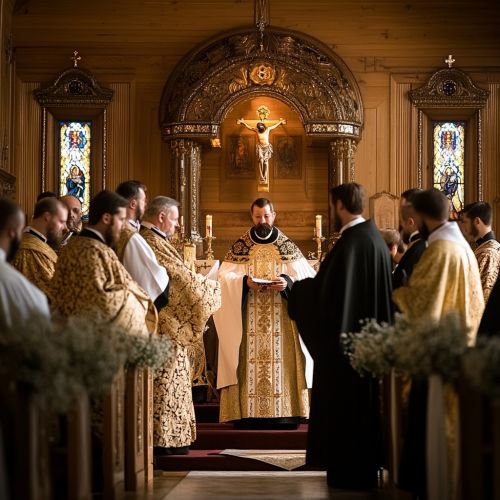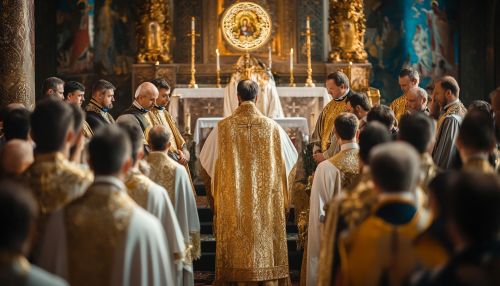Gene Robinson: Difference between revisions
(Created page with "== Early Life and Education == Gene Robinson, born Vicky Gene Robinson on May 29, 1947, in Fayette County, Kentucky, is a prominent figure in the Episcopal Church, known for his groundbreaking role as the first openly gay bishop in the Anglican Communion. Raised in a devout Christian family, Robinson's early life was steeped in religious tradition, which laid the foundation for his future in ecclesiastical leadership. He attended the University of the South in Sewan...") |
No edit summary |
||
| Line 11: | Line 11: | ||
In 2003, Robinson was elected as the Bishop of New Hampshire, a decision that garnered significant attention due to his open identification as a gay man. His election was a pivotal moment in the history of the Anglican Communion, sparking widespread debate and discussion regarding the inclusion of LGBTQ+ individuals in church leadership roles. Robinson's consecration took place on November 2, 2003, amidst both support and controversy. His presence as a bishop challenged traditional norms and prompted a reevaluation of the church's stance on sexuality and leadership. | In 2003, Robinson was elected as the Bishop of New Hampshire, a decision that garnered significant attention due to his open identification as a gay man. His election was a pivotal moment in the history of the Anglican Communion, sparking widespread debate and discussion regarding the inclusion of LGBTQ+ individuals in church leadership roles. Robinson's consecration took place on November 2, 2003, amidst both support and controversy. His presence as a bishop challenged traditional norms and prompted a reevaluation of the church's stance on sexuality and leadership. | ||
[[Image:Detail-98449.jpg|thumb|center|A solemn church ceremony with clergy in traditional vestments, focusing on a central figure being consecrated.|class=only_on_mobile]] | |||
[[Image:Detail-98450.jpg|thumb|center|A solemn church ceremony with clergy in traditional vestments, focusing on a central figure being consecrated.|class=only_on_desktop]] | |||
== Impact and Controversy == | == Impact and Controversy == | ||
Latest revision as of 00:36, 12 October 2024
Early Life and Education
Gene Robinson, born Vicky Gene Robinson on May 29, 1947, in Fayette County, Kentucky, is a prominent figure in the Episcopal Church, known for his groundbreaking role as the first openly gay bishop in the Anglican Communion. Raised in a devout Christian family, Robinson's early life was steeped in religious tradition, which laid the foundation for his future in ecclesiastical leadership. He attended the University of the South in Sewanee, Tennessee, where he earned a Bachelor of Arts degree in American Studies. His academic pursuits continued at the General Theological Seminary in New York City, where he received a Master of Divinity degree in 1973.
Ordination and Ministry
Robinson was ordained as a deacon in 1973 and as a priest in 1974, beginning his ministry in the Diocese of New Hampshire. His early work focused on parish ministry, where he demonstrated a commitment to social justice and inclusivity. Robinson's approach to ministry was characterized by a deep pastoral sensitivity and an emphasis on community building. He became known for his ability to engage with diverse congregations, fostering environments of acceptance and understanding.
Episcopal Election and Consecration
In 2003, Robinson was elected as the Bishop of New Hampshire, a decision that garnered significant attention due to his open identification as a gay man. His election was a pivotal moment in the history of the Anglican Communion, sparking widespread debate and discussion regarding the inclusion of LGBTQ+ individuals in church leadership roles. Robinson's consecration took place on November 2, 2003, amidst both support and controversy. His presence as a bishop challenged traditional norms and prompted a reevaluation of the church's stance on sexuality and leadership.


Impact and Controversy
Robinson's consecration as bishop had profound implications for the Episcopal Church and the broader Anglican Communion. It highlighted the ongoing tensions between progressive and conservative factions within the church. His leadership was marked by efforts to bridge these divides, advocating for dialogue and understanding. Robinson's tenure as bishop was not without challenges; he faced significant opposition from conservative elements within the church, leading to discussions about schism and realignment within the Anglican Communion.
Advocacy and Legacy
Beyond his role as bishop, Robinson has been an outspoken advocate for LGBTQ+ rights and social justice. He has worked tirelessly to promote inclusivity within the church and society, using his platform to address issues of discrimination and inequality. Robinson's advocacy extends beyond ecclesiastical boundaries, engaging with broader societal issues and contributing to public discourse on human rights.
Retirement and Continued Influence
Robinson retired as Bishop of New Hampshire in 2013 but has remained active in public life. He continues to speak and write on issues related to faith, sexuality, and social justice. Robinson's influence extends beyond the Episcopal Church, as he participates in interfaith dialogues and collaborates with various organizations dedicated to advancing equality and understanding.
